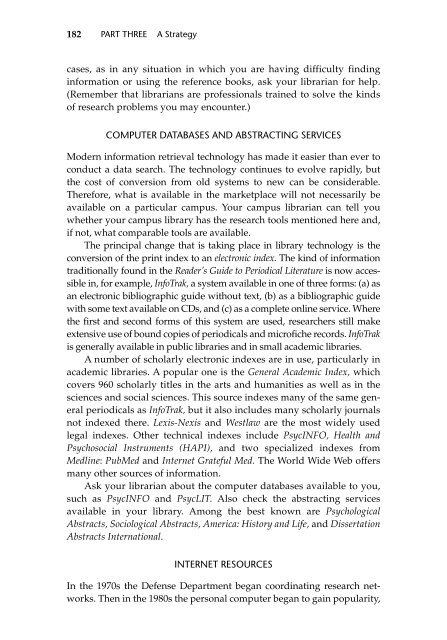Beyond Feelings
Beyond Feelings
Beyond Feelings
Create successful ePaper yourself
Turn your PDF publications into a flip-book with our unique Google optimized e-Paper software.
182 PART THREE A Strategy<br />
cases, as in any situation in which you are having difficulty finding<br />
information or using the reference books, ask your librarian for help.<br />
(Remember that librarians are professionals trained to solve the kinds<br />
of research problems you may encounter.)<br />
COMPUTER DATABASES AND ABSTRACTING SERVICES<br />
Modern information retrieval technology has made it easier than ever to<br />
conduct a data search. The technology continues to evolve rapidly, but<br />
the cost of conversion from old systems to new can be considerable.<br />
Therefore, what is available in the marketplace will not necessarily be<br />
available on a particular campus. Your campus librarian can tell you<br />
whether your campus library has the research tools mentioned here and,<br />
if not, what comparable tools are available.<br />
The principal change that is taking place in library technology is the<br />
conversion of the print index to an electronic index. The kind of information<br />
traditionally found in the Reader’s Guide to Periodical Literature is now accessible<br />
in, for example, InfoTrak, a system available in one of three forms: (a) as<br />
an electronic bibliographic guide without text, (b) as a bibliographic guide<br />
with some text available on CDs, and (c) as a complete online service. Where<br />
the first and second forms of this system are used, researchers still make<br />
extensive use of bound copies of periodicals and microfiche records. InfoTrak<br />
is generally available in public libraries and in small academic libraries.<br />
A number of scholarly electronic indexes are in use, particularly in<br />
academic libraries. A popular one is the General Academic Index, which<br />
covers 960 scholarly titles in the arts and humanities as well as in the<br />
sciences and social sciences. This source indexes many of the same general<br />
periodicals as InfoTrak, but it also includes many scholarly journals<br />
not indexed there. Lexis-Nexis and Westlaw are the most widely used<br />
legal indexes. Other technical indexes include PsycINFO, Health and<br />
Psychosocial Instruments (HAPI), and two specialized indexes from<br />
Medline: PubMed and Internet Grateful Med. The World Wide Web offers<br />
many other sources of information.<br />
Ask your librarian about the computer databases available to you,<br />
such as PsycINFO and PsycLIT. Also check the abstracting services<br />
available in your library. Among the best known are Psychological<br />
Abstracts, Sociological Abstracts, America: History and Life, and Dissertation<br />
Abstracts International.<br />
INTERNET RESOURCES<br />
In the 1970s the Defense Department began coordinating research networks.<br />
Then in the 1980s the personal computer began to gain popularity,


